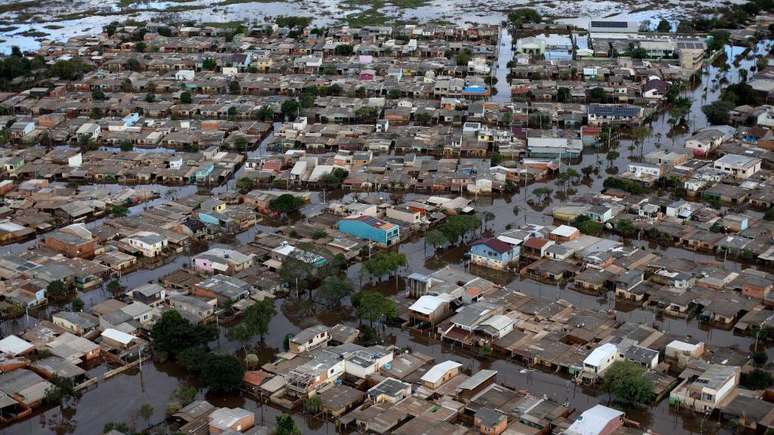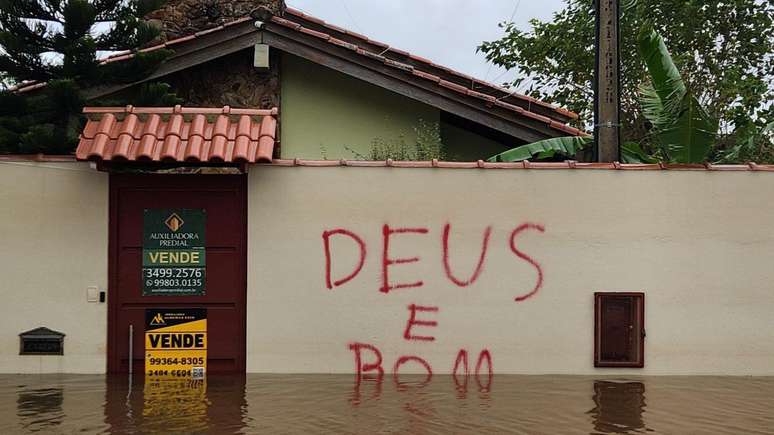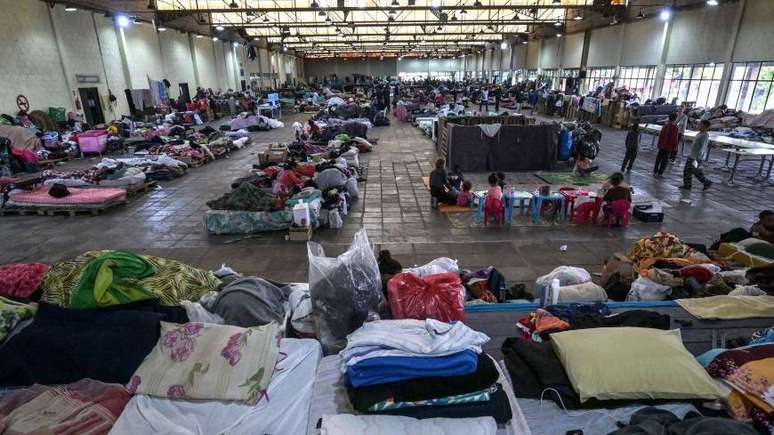Violence and crime in shelters quickly became a concern amid the crisis.
At the height of the humanitarian crisis caused by the floods in Rio Grande do Sul, emergency shelters housing around 5,000 people were erected in the cities of Guaíba and Canoas, both in the metropolitan region of the capital of Rio Grande do Sul.
But among the families who left their homes and their stories in search of help there were also members of criminal factions.
People working on the front lines in shelters in the Porto Alegre metropolitan region told BBC News Brasil that factions even carried out physical divisions in shelters and chose strategic locations to deploy their members.
“They also sorted which rooms belonged to certain groups and people,” said one shelter worker, who asked not to be identified.
“Faction members said that all living quarters would be divided into tunnels, like prisons. They also tried to control how food was received.”
This behavior of criminals in shelters reflects the power of factions in communities, says sociologist Rodrigo Azevedo, professor of law at the Pontifical Catholic University (PUC-RS) and member of the Brazilian Forum for Public Security.
“These groups dominate these territories in daily life in a normal situation and, evidently, they will try to maintain this dominance in this refuge situation,” says Azevedo.
“Therefore it is important that there is the presence of public authorities, of law enforcement.”
However, the factions’ dominance in the shelters, which also included control of some of the distribution of donations, lasted only a few days.
According to sources interviewed by the report, on the third day of the crisis, the first action was to redistribute the people housed in smaller accommodation.
Instead of a venue that could accommodate 5,000 people at once, the new properties had an occupancy limit of up to 120.
The strategy was to distribute people to decentralize the power of the factions.
At the same time, 65 police reports were registered for flood-related crimes in the South. In most cases, thefts and robberies.
Rio Grande do Sul’s Minister of Public Security, Sandro Caron, acknowledges in an interview with BBC News Brasil that criminals had an easier time acting in the first days of the tragedy because the security forces were busy with the rescue efforts.
“In the first three days we had to choose. We had to choose to save lives,” says Caron.
A report from the Ministry of Justice highlighted that in Rio Grande do Sul there are 15 active criminal factions, but only two of them have state cover: Bala na Cara and Os Manos.
Azevedo, however, says that the Red Command (CV) and the Primeiro Comando da Capital (PCC), considered the largest factions in the country, have no interest in penetrating the state.
“This happens because the South is not a transit route for drugs produced in South America to Europe,” explains the professor.
“So, for them, competing for power in the North and Northeast region is more interesting, because there is a gateway there.”
However, Azevedo says that even though they are not present in Rio Grande do Sul, the CV and the PCC continue to do business with criminals in the region.
In addition to home robberies, more significant looting was recorded, especially in shops near the Salgado Filho airport in Porto Alegre. The main targets were shops selling electronic devices, such as cell phones, and a tire shop.
Experts point out that these crimes appear to have been planned by criminal factions to recover part of the losses suffered from the floods.
Caron, however, claims that these actions were committed by specialized gangs not linked to the organizations.
“We work with what we actually have. In this case it is not a criminal organization, but a specialized group”, explains the secretary.
“In one more elaborate case or another, what we have are gangs that specialize in property crime, just as there are gangs that specialize in vehicle theft.”
Violence in shelters

Violence and crime in shelters quickly became a concern in the context of the crisis.
Sheltered people interviewed by BBC News Brasil, mainly women, reported fear of abuse and discomfort from living with so many strangers in the same environment.
Based on criminal records, public authorities began to open exclusive housing for women and children.
Sandro Caron says 54 people have been arrested inside the shelters for sex crimes, assaults, domestic violence cases and theft.
“In the vast majority of cases of abuse, the perpetrator was a family member of the victim and the abuse had already occurred before. However, when it happened in the shelter, the police were present and they were arrested,” he says the Secretary.
“It’s a very sensitive topic that people have been very concerned about in the last few days in relation to shelters. Because you take hundreds of people with different profiles, with different thoughts, who don’t know each other, and you put them in the same place.”
A video circulating on social media shows a couple harassed and expelled from a shelter after allegedly having sex near children.
There are also reports that people in shelters have taken stolen items to store inside the shelters.
At the height of the crisis, some people stranded in flooded areas and housed in shelters told the reporter they stayed home out of fear that their remaining items would be stolen.
They also said they had been threatened by members of criminal organizations not to leave their homes.
Delegate Fernando Sodré, head of Rio Grande do Sul’s civil police, told BBC News Brasil that he had heard no reports of such threats.
“This is an urban legend because there is nothing, absolutely nothing, to that effect,” Sodré says.
The Minister of Public Security says he has heard from many people that the crime rate will increase in the first weeks after the crisis begins.
“That didn’t happen. In the first 20 days of May we had a 44 percent reduction in homicides compared to the same period last year. We had a 60 percent reduction in robberies,” he says.
Os Manos and Bala na Cara

According to Rodrigo Azevedo, the first faction to emerge in the prison system of the capital of Rio Grande do Sul was the Os Manos group, which soon strengthened in the 1980s and expanded into cities in the region, such as Canoas and Guaíba.
He says that, in the early 2010s, the Bala na Cara faction was created and began to have a very strong presence in the Porto Alegre metropolitan region.
She became known for the way she committed her crimes and killed her enemies, all with great cruelty and filmed for publicity.
Uncomfortable with such growth, smaller groups came together and created Anti Bala in 2017. The intention was to eliminate Bala na Cara members.
“The culmination of these conflicts was in 2017, when the murder rate increased greatly here in the state, especially in Porto Alegre. But since then there has been an accommodation. The Bala na Cara have maintained their territories. Even the other groups have managed to structure themselves in some way,” says Azevedo.
“The Brothers did not enter much into this direct struggle because they preferred to remain with this dominion in Greater Porto Alegre and also with ramifications within the state.”
Fall and restructuring of the factions
The tragedy that struck hundreds of cities in Rio Grande do Sul did not choose its targets and also dealt a heavy blow to criminal factions, according to experts interviewed by the BBC.
Two sources told the report that they were aware that the places where these factions’ weapons and drugs were stored had been hit by floods and caused serious damage to crime.
The Secretary of State for Public Security says that the police also took advantage of the situation to carry out operations, especially in Porto Alegre.
“In these attempts by criminals to seize weapons and drugs, we have made several arrests and seizures. We constantly carry out intelligence work and are always a few steps ahead,” says Caron.
After the losses caused by organized crime, experts predict a wave of robberies and thefts to offset the damage caused by the floods.
Azevedo believes that some of the crimes already recorded during the crisis may also be linked to criminal factions.
In poorer regions, he says, organized crime doesn’t have as much money and has to carry out smaller acts, mainly robberies and thefts, to make up for what it has lost.
“This may partly explain the fact that these minor crimes are somehow linked to these groups,” he says.
Caron says police also assess this could happen and say they are following the example of other countries that have experienced similar tragedies.
The intention is to suffocate the factions to avoid an escalation of crimes, especially against property, after the floods.
“Whenever there is a problem of job losses, it affects the economy. Taking this into account, it is clear that we will focus on property crimes,” the secretary says.
“In affected areas where intelligence identifies an increase in these crimes, we will strengthen our policing.”
The secretary also says he will pay special attention to “temporary cities” where some of those affected by the floods are expected to be temporarily taken.
Temporary structures will be built in these areas so that the homeless can remain until they are restored.
The concern is that these new territories, being in more remote areas, may have a greater presence of organized crime and an increase in crime.
Caron points out that he suspended holidays and called up reservists during the crisis. He assures that the police will act with maximum force and for as long as necessary to contain crimes in Rio Grande do Sul.
“I can guarantee there will be zero tolerance.”
Source: Terra
Rose James is a Gossipify movie and series reviewer known for her in-depth analysis and unique perspective on the latest releases. With a background in film studies, she provides engaging and informative reviews, and keeps readers up to date with industry trends and emerging talents.






